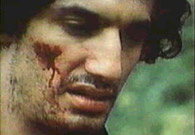

|
| home | movie reviews | features | sov horror | about | forum |
The Last House on the Left A-
Year Released: 1972
As flawed as it is, it's amazing that Last House on the Left manages to be such an emotionally shattering experience. Based loosely on Ingmar Bergman's The Virgin Spring, Wes Craven's debut feature begins with two teenage girls who try to score some grass on the way to a rock concert but instead get kidnapped by a gang of escaped convicts who drag them into the woods to torture, rape, and kill. With the vicious deeds done and their car broken down, the cons take refuge from the night at the home of a kind married couple -- who, of course, turn out to be the parents of one of the girls they just murdered. What're the odds? Watching it for the first time at 14, it had a visceral impact on me that no film before or since has matched. As a kid who'd grown up with the Friday the 13th and Nightmare on Elm Street films, I could watch a gory disembowling without batting an eye. Last House was different. It was the first time that movie violence felt real, made me sick and uncomfortable, and hurt. My anxiety quickly led to an intense hatred for Weasel (Fred J. Lincoln), Sadie (Jeramie Rain), and, especially, Krug (David Hess), the leader of the group, who kept his son (Marc Sheffler) hooked on drugs to control him. I was so blinded by hatred upon the first viewing that I failed to see how disgusted Krug and company were by their own actions. It wasn't until later that I realized that as sick as these fucks were, they were also recognizably human and felt remorse. Last House on the Left begins like a relatively lighthearted coming-of-age story with flashbacks showing Mari Collingwood (Sandra Cassel), the daughter of upscale small-town parents, becoming friends with Phyllis Stone (Lucy Grantham), a tough city girl that Mari's parents don't like. The easygoing tone tricks us into letting our guard down, so that when the girls are abducted it's an intensely frightening left turn. Unfortunately, in a severely misguided attempt at comic relief, the film intercuts a god-awful "dumb cops" subplot with the main narrative. Nevertheless, the subplot with the cops can't detract from the queasy, unbearable tension of the scenes of Krug and his cohorts with Mari and Phyllis in the woods. There's a deeply affecting moment when Krug is forcing both girls to strip down and Mari is crying, saying she can't, and Phyllis holds her and says, "It's just you and me here. Nobody else. Just you and me, okay?" The emotional honesty of that scene just kills me, and I nearly break down and cry and every time. The grainy handheld 16mm footage adds to the rough documentary-like realism. Similarly powerful is when a dazed Mari, after being brutalized and raped, walks off into a pond while Krug, Weasel, and Sadie stand around, unable to speak or look at each other. The scene provides a quiet, sobering sense of closure to the devastating brutality that had gone before it. Of course, it's not over yet. Often foolishly condemned as sleazy exploitation, Last House on the Left is uncompromisingly honest in depicting the ugliness of violence and the emptiness it leaves behind. When Krug has blood on his hands, there's no sense of victory, not even the slightest hint of perverse satisfaction -- just the quiet remorse of a guy who's disgusted with the person he is but too scared to admit it. When the final act turns into an over-the-top revenge fantasy, we're tempted to urge the parents on because we want to see Krug and company pay horribly for what they've done. But the ensuing violence brings us no satisfaction or pleasure. Instead, it's depressing to see these nice folks reduced to the animalistic level of their child's killers. And when they've succeeded and the chainsaw is taken away, there's no release -- just a heavy, sickening sense of defeat. It's like the song says: the road leads to nowhere. Review published 12.29.2002. Follow Michael Scrutchin on Twitter or Letterboxd.
|

|
| home | movie reviews | features | sov horror | about | forum |
| This site was previously at flipsidemovies.com from 2000 to 2008. |
|
contact | copyright | privacy | links | sitemap
Flipside Movie Emporium (FlipsideArchive.com)
|